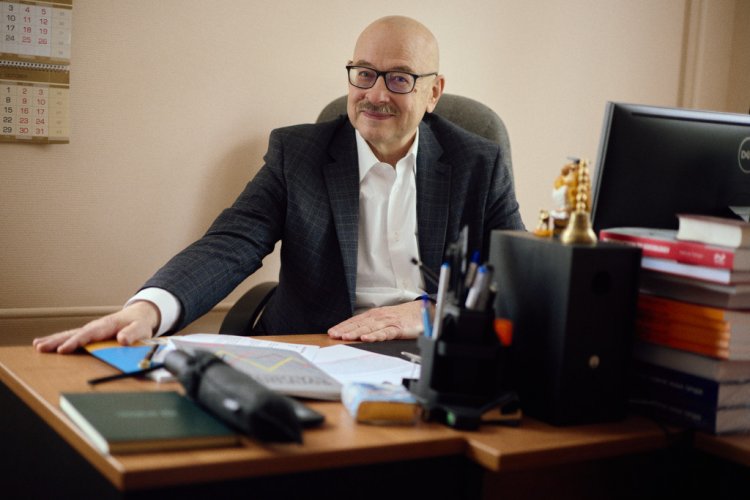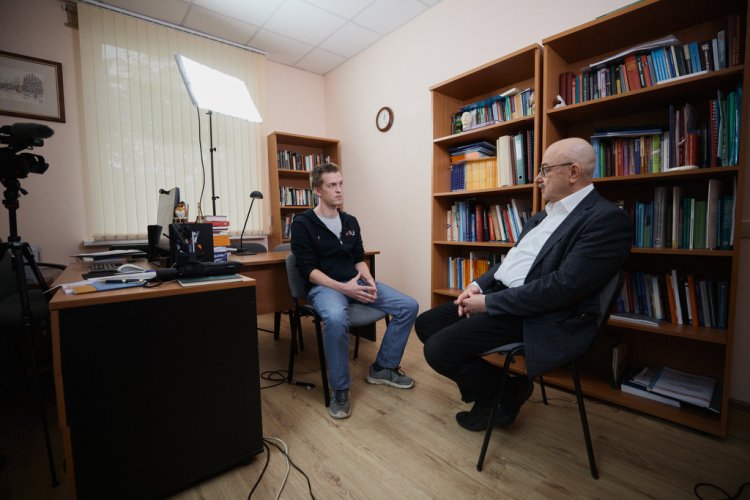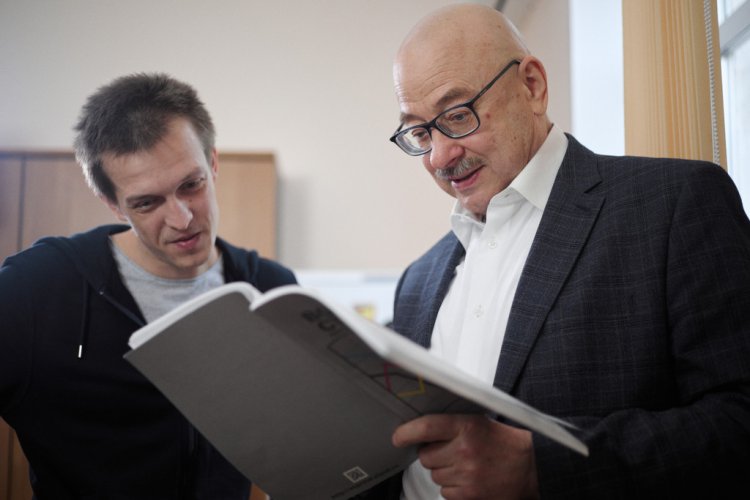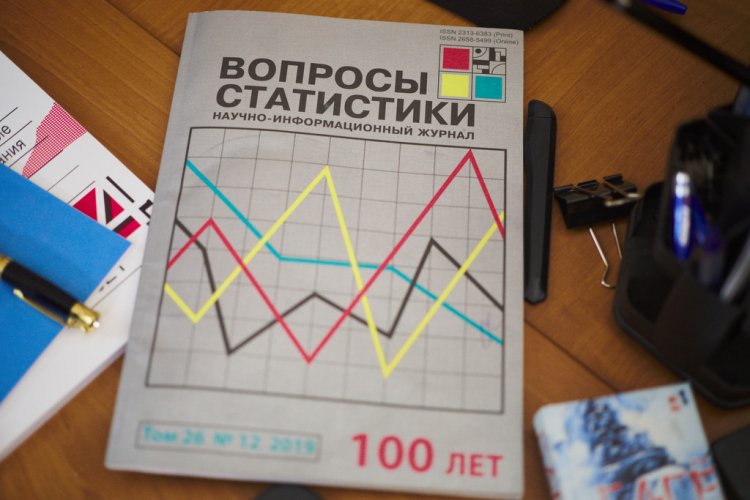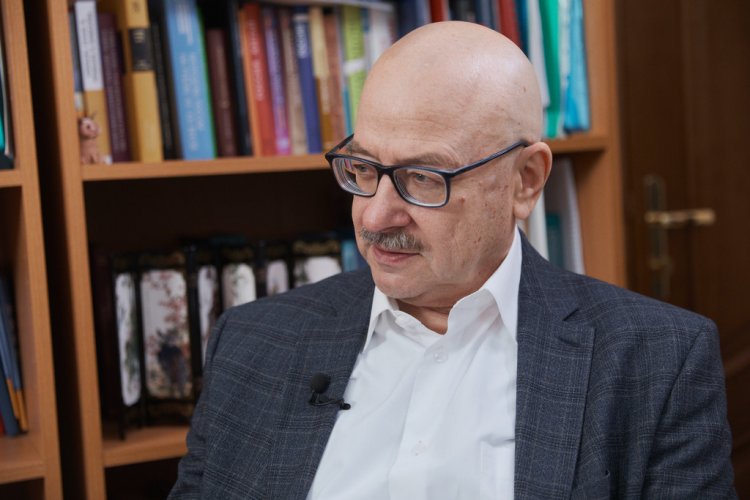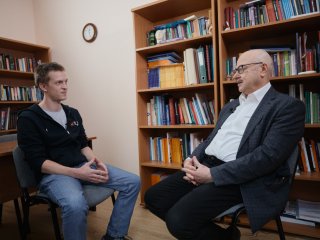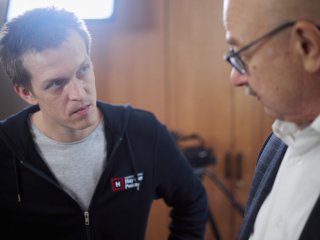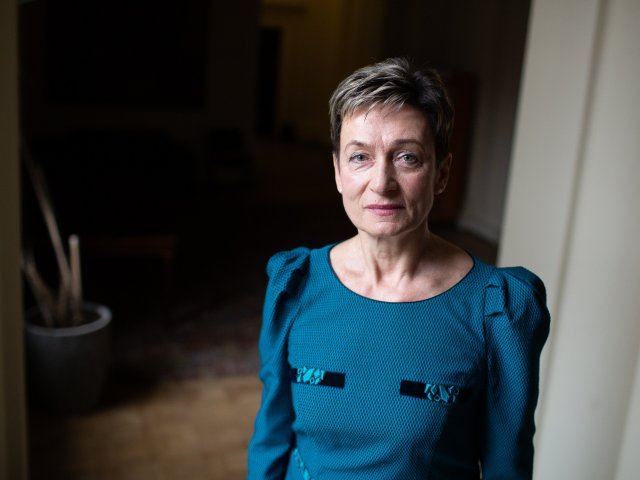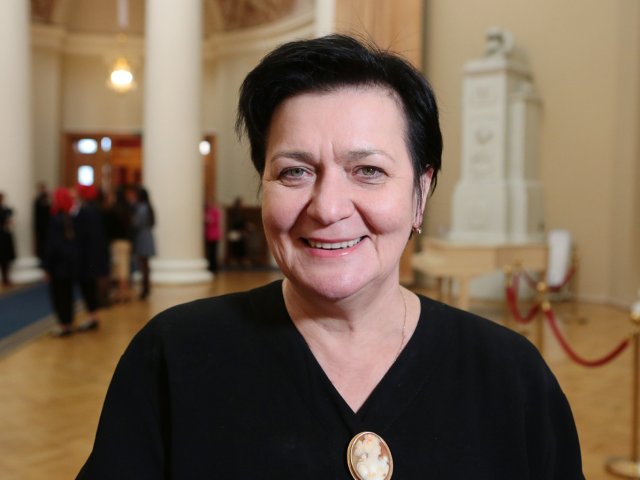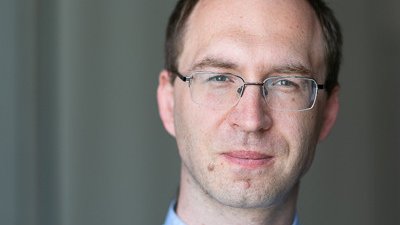In the Year of Science and Technology, the number of scientific news, publications about new development projects, technology, and research has increased significantly. For example, news on plans to study the Moon, new energy and carbon-free development, or research on accelerators.
Scientific Russia talked with Corresponding Member of the Russian Academy of Sciences, Doctor of Sociological Sciences Mikhail Fyodorovich Chernysh about how society treats scientific publications: how popular they are, and how much society trusts them.
Mikhail Fyodorovich Chernysh
Photo: Nikolay Malakhin, Scientific Russia
- How did the Year of Science and Technology affect public interest in science, and what do sociological studies say about the popularity of science in Russia?
- The Year of Science and Technology is the time when it is necessary to popularize science. However, there is a situation in the world when additional efforts are not needed for this: science has turned out to be the last frontier, a means of saving many people during the COVID-19 pandemic. It turned out that only scientific research can put barriers to the epidemic and stop it completely.
This understanding has come to all layers of our society. People realized that scientists are working day and night, studying a new phenomenon, developing new drugs and vaccines. Scientists have become a real shield together with doctors who treat based on scientific research.
The Year of Science and Technology is important for people who are interested in new research, but the epidemic has also sharpened people’s attention to new achievements.
- Has attention sharpened not only to medicine? Can we say that following medical research, people began to be interested in related fields of science, of which there are many?
- Sure. After all, medicine stands on fairly solid base, which is formed by fundamental science. This is biology and genetics – one of its most important branches. Behavioral sciences and social sciences help to understand how patients and medical staff behave in new conditions. There is also physics – modern medicine is based on the latest achievements of this science.
- Are you basing your opinion on sociological research or making logical conclusions?
- To a greater extent, these are logical conclusions. Of course, research has been conducted, and there has been quite a lot of research in the past and present. It highlighted certain fragments of interaction between society and science. But what I am saying now is an attempt to summarize this interaction, an attempt to understand how the general outline of these interactions develops.
Within the framework of phenomenological sociology, studies of medicine and the question “What influences the recovery of patients?” were conducted. Obviously, the role of doctors is important. But it turned out that the decisive role is played by the average medical staff: the very nurses who are often ignored. This conclusion helped clinics to improve the recovery process, paying special attention to the qualifications and interaction of the average medical staff with patients.
This is one of the examples of our research.
Photo: Nikolay Malakhin, Scientific Russia
- Of course, the pandemic is an incentive to popularize science. But what other factors can influence this interest in the long term?
- Science is the most important part of the life of modern society, one of the most important institutions. One of Russia’s greatest achievements is that we have built such an institution in society.
If you count with your fingers, ten countries at most have big science. In fact, there are fewer of them. These is Russia, the US, UK, France. In the past there was Germany. Now China is investing a lot of money in science. And we are in this small, elite group of countries that has the opportunity to influence the rest of humanity in a scientific matter, to reveal new meanings, and report discoveries. I think it’s great.
Speaking about the factors that influence public interest in science, I will start with a short historical digression.
My generation grew up in the Soviet Union – a scientific, knowledge-oriented state. We understand all the shortcomings and limitations that existed at that time, but science was actively popularized then. It was considered an area that contains and communicates to society the most important meanings of life and is itself one of the key social values.
This attitude to science has been instilled in a significant part of our population: it is used to thinking in scientific terms. Even when society tries to switch to the rails of other judgments, for example, esotericism, scientific terminology is still used. It looks absurd, but science has become ingrained in the very essence of our society, along with education and the history of our great achievements. We realized that it could be the strength and glory of Russian society.
- Is the interest in science no lower now than it was in the Soviet Union? Does that drive for scientific interest continue to move the popularity of science forward?
- The situation is, of course, paradoxical. That incentive, definitely, continues to maintain the status of science at a high level. For example, a study conducted last year showed that the level of public confidence in the Russian Academy of Sciences (RAS) is in second place. People trust RAS more than many other functioning institutions of the state.
- And what is in the first place?
- The military.
- Speaking of trust and returning to the pandemic: the current situation has generated an unprecedented number of scientific publications. Among this flow of information, there were also many anti-scientific and fake publications. Has this situation undermined interest in science?
- Unlikely. Science is an area where there is a continuous discussion on a variety of issues. In science, there cannot be the only true teaching and the only correct point of view – this is its peculiarity and a huge advantage.
Of course, society cannot always cope with the diversity of points of view, for example, in a situation where one part of the scientific community strongly recommends vaccination and the other talks about side effects and other dangers. Then the question arises: how to behave in a situation where even among scientists there is no single point of view? But the discussion is important because it helps to develop a common position on the situation we are in. Now, this position has been worked out: vaccination is necessary.
And the discussion continues, and it must continue because this is the essence of science.
Photo: Nikolay Malakhin, Scientific Russia
Photo: Nikolay Malakhin, Scientific Russia
- In another interview, a psychologist, Professor of the Russian Academy of Sciences noted that one of the reasons for low vaccination rate in Russia was precisely the discussion among the scientific community. Moreover, this discussion was open, in scientific publications and news. Should there be such openness of points of view? Does it negatively affect the credibility of science?
- Of course, discussions should be held openly. This is the only way scientists develop a common position on some issues. Only by arguing and refuting each other, they come to a common point of view, which has now prevailed.
As for the low vaccination rate: we made a research on vaccination. According to the latest study, the number of vaccinated in Russia is about 30 percent. But another 30 percent say they had COVID-19 and recovered and therefore do not go for vaccination. This is not a lack of trust in science: people know that they have antibodies and, based on the scientific data, they know that they don’t have to be vaccinated.
- And the discussion continues. After all, now they have begun to raise the issue of boosters every six months…
- The discussion continues and will continue as long as the coronavirus remains a threat at individual and societal levels. There is nothing you can do about it, and there is no need to do anything because scientific research is constantly going on. The laboratories are working day and night to understand this virus and how it can affect the fate of people, society. This work does not stop for a day: new data and new drugs appear.
For example, new projects were presented at the general meeting of the Academy of Sciences. Including vaccines that will be administered as a cocktail or instilled into the nose. This is a new level of vaccination, a much less painful way to mitigate the disease and reduce the number of complications.
And Skolkovo has developed a test that allows you to diagnose COVID-19 and its type within a few seconds.
Science continues to work, and open publications are part of a diverse scientific process. And it’s not just about the coronavirus.
- Regarding scientific publications: are there any studies that will help to understand in which format society actively consumes scientific information? Could this help answer the question of how to further popularize science?
- The popularization of science is a special direction, and much has not yet been done here. We must move on, and it seems to me that in this sense we have not yet reached the Soviet level.
There were a lot of popular science magazines in the USSR, distributed not only among scientists but also among young people. They read a lot and prepared themselves for a life in science, loved it. The magazines were issued in millions of copies.
At some point, science lost its status in Russian society, especially in the post-Soviet era. Then the priorities shifted towards business, they said that it was necessary to earn money, and science, as a job, rolled aside.
- Is this the process of the 90s?
- Yes, this is the process of the 90s, which we have not yet overcome. At that time, the salaries of scientists fell below the survival bar: many migrated abroad, and it was a huge loss for the country and the process of science popularization. What to expect if scientists are not among the successful categories in Russian society? What young people will go into science? In the 90s, the influx of young people slowed down and almost stopped, and now it is necessary to make special efforts to resume this flow.
- After all, the popularization of science and the public’s interest in it is the path that future scientists, professors, and academics follow…
- Sure. Firstly, these are popular science magazines and books that used to be binge-read since school. Secondly, there are relevant programs on TV, headings in the media, Internet portals that highlight new achievements and discuss the state of Russian and foreign science.
I’m sure that most people, even those who are not very knowledgeable in science, read the Science column in any of the popular publications with great interest, looking for important answers for themselves. What does science promise us in the future? Is it possible to hope for discoveries, for example, in the field of health? Everyone reads it.
- Does the curiosity of society “burn out” with a certain amount of scientific news? For example, if we recall the summer and autumn of 2020 when every third publication was devoted to the pandemic, there were often statements such as “I’m tired of the news about the coronavirus, I won’t read it…”
- Yes, they get tired of it. But then they read it anyway. The interest is so acute, and the question is so important that it will not be possible to avoid it. We understand that science may be the only thing that can protect us at this time.
Mikhail Fyodorovich Chernysh
Photo: Nikolay Malakhin, Scientific Russia
- Returning to the trust in science and vaccination. When Sputnik V was developed in Russia, a galaxy of scientists advocated vaccination, which became available. But there was also quite a strong distrust in the domestic vaccine, which decreased only after an article in The Lancet. They don’t believe our statements, but is there more trust in foreign ones?
- Sputnik V was developed. Before that, a significant part of the population, even the educated, was sure that Russian science, if not dead, was close to this state and was capable of little. Suddenly there is such an unexpected product that says that we have brains and technology.
It took time and confirmation, which we received from a respected journal.
There is another point that we try to ignore. The fact is that the level of reporting imposed on Russian science by ministries is such that it is necessary to report on publications that, first of all, are indexed in foreign databases. Our science management bodies require us to confirm our qualifications by making publications in foreign journals.
- Maybe it is the requirement for publications in foreign journals that allows us to hold steady in the top five scientific-leading countries?
- After all, here to a large extent we live with the same baggage. If we talk about how to stay among those leading countries in the field of science, then there is no one magic method. And, of course, this is not the number of publications in foreign journals.
Foreign colleagues will surpass us anyway: there are many of them and they are published very actively. But the question is about the quality of these publications: are they all good? If the task is to report on the number of publications, and an ever-increasing one, will this not lead to the content being inflated? This is exactly what is happening now. Quantitative indicators do not solve the problem, it lies in the general state of science and the scientific community. If the scientific community is strong, then it begins to censor itself, at the international level as well.
Scientists develop their dignity, an opinion is formed within the scientific community about who is real and who is not, who has real achievements and who does not. And scientists, believe me, are the toughest judges of each other.
- Should scientists go to people on their initiative to increase the popularity of science?
- Definitely. There should be a series of lectures that scientists publish. Moreover, lectures should not just be educational, they should allow us to understand what is happening in science, what is the position of science on the most important issues of existence and life.
For example, social sciences could talk about the state of modern society, which is now at a turning point. About what the consequences of these conditions may be.
Leading physicists could speak about the ideas of modern physics on the universe. It would be a fantastic series of lectures: the universe is just opening up to us, there are lots of secrets, and discoveries make an amazing impression on people who get acquainted with it.
- Many science fiction books were published in the 20th century. How are science fiction and the level of interest in scientific knowledge related?
- For me, one of the signs of the crisis in which the Soviet Union found itself in its last phase was the almost complete disappearance of science fiction movies. Movies in which people strained their minds to understand what the world could be, and what the future could be. At some point, these broadcasts were crossed out.
And before that, there were quite a lot of them: in the 60s, movies were shot, which are now in the golden collection. The Amphibian Man: a wonderful movie, with wonderful actors. Or Planeta Bur: about flights to Mars, which we have just begun to dream about again.
Back then, many similar movies were shot, and it demonstrated that society had a future. As soon as fiction disappears, science enters a crisis, and the society finds itself in a crisis state as well. The vision of the future and assumptions about it are disappearing from the public consciousness. You need to be attentive to this.
Now the cinema is dominated by the past, there is very little future in it. There is a feeling that we are afraid to think about the future.
- Speaking of the future: at some point, the COVID-19 pandemic will reach the danger level of, say, influenza. The pandemic will disappear from the mainstream news feeds and the shake-up it has given in the field of science will end. What could be the next shake-up?
- Ecology. We are now seeing this struggle. Scientists say that the atmosphere is warming up, glaciers are melting. We are witnesses to how the weather is changing. Even in Russia, a country with a temperate climate, we see various anomalies. Serious changes are taking place and concern everyone: changes both in nature and society that only science can investigate.
The subject of study and close interest of the society will be geophysics, geology, biology. Everything related to the research of atmosphere, oceans, and the influence of cosmic bodies on the life of the Earth. Because the survival process will depend on it.
- Have there been any studies conducted on people who are interested in scientific knowledge? Is it possible to answer why people like these publications: some like it, for example, for personal applied purposes, others, perhaps, are looking for answers to philosophical questions…?
- I don’t recall the question of why people turn to science being asked here or abroad.
But it seems to me that the most important reason for turning to science, and especially in Russian society, is hope. People want to have hope and faith in the future.
It turns out that it is the science that gives answers to a lot of questions concerning the future. Not only physics or biology but also social sciences. By studying society, identifying its pain problems, drawing society’s attention to these problems, bringing them to public discussion, we help society avoid critical circumstances.
The interview was conducted with the support of the Ministry of Science and Higher Education of the Russian Federation and the Russian Academy of Sciences.
Photo: Nikolay Malakhin, Scientific Russia
